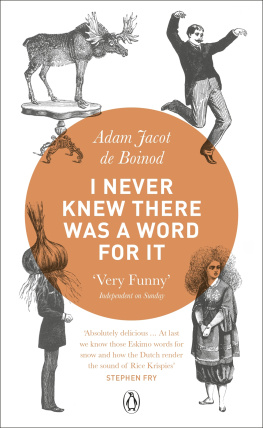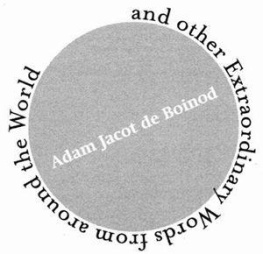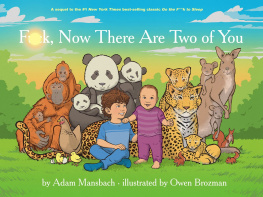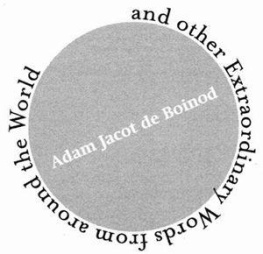Adam Jacot de Boinod - I Never Knew There Was a Word for it
Here you can read online Adam Jacot de Boinod - I Never Knew There Was a Word for it full text of the book (entire story) in english for free. Download pdf and epub, get meaning, cover and reviews about this ebook. year: 2010, publisher: Penguin Books Ltd, genre: Home and family. Description of the work, (preface) as well as reviews are available. Best literature library LitArk.com created for fans of good reading and offers a wide selection of genres:
Romance novel
Science fiction
Adventure
Detective
Science
History
Home and family
Prose
Art
Politics
Computer
Non-fiction
Religion
Business
Children
Humor
Choose a favorite category and find really read worthwhile books. Enjoy immersion in the world of imagination, feel the emotions of the characters or learn something new for yourself, make an fascinating discovery.
- Book:I Never Knew There Was a Word for it
- Author:
- Publisher:Penguin Books Ltd
- Genre:
- Year:2010
- Rating:5 / 5
- Favourites:Add to favourites
- Your mark:
- 100
- 1
- 2
- 3
- 4
- 5
I Never Knew There Was a Word for it: summary, description and annotation
We offer to read an annotation, description, summary or preface (depends on what the author of the book "I Never Knew There Was a Word for it" wrote himself). If you haven't found the necessary information about the book — write in the comments, we will try to find it.
I Never Knew There Was a Word for it — read online for free the complete book (whole text) full work
Below is the text of the book, divided by pages. System saving the place of the last page read, allows you to conveniently read the book "I Never Knew There Was a Word for it" online for free, without having to search again every time where you left off. Put a bookmark, and you can go to the page where you finished reading at any time.
Font size:
Interval:
Bookmark:
Was a Word For It
ADAM JACOT DE BOINOD
With illustrations by Sandra Howgate

PENGUIN BOOKS
PENGUIN BOOKS
Published by the Penguin Group
Penguin Books Ltd, 80 Strand, London WC2R 0RL , England
Penguin Group (USA), Inc., 375 Hudson Street, New York, New York 10014, USA
Penguin Group (Canada), 90 Eglinton Avenue East, Suite 700, Toronto, Ontario, Canada M4P 2Y3
(a division of Pearson Penguin Canada Inc.)
Penguin Ireland, 25 St Stephens Green, Dublin 2, Ireland (a division of Penguin Books Ltd)
Penguin Group (Australia), 250 Camberwell Road, Camberwell, Victoria 3124, Australia
(a division of Pearson Australia Group Pty Ltd)
Penguin Books India Pvt Ltd, 11 Community Centre, Panchsheel Park, New Delhi 110 017, India
Penguin Group (NZ), 67 Apollo Drive, Rosedale, North Shore 0632, New Zealand
(a division of Pearson New Zealand Ltd)
Penguin Books (South Africa) (Pty) Ltd, 24 Sturdee Avenue, Rosebank, Johannesburg 2196, South Africa
Penguin Books Ltd, Registered Offices: 80 Strand, London WC2R 0RL , England
www.penguin.com
The Meaning of Tingo first published in Penguin Books 2005
Toujours Tingo first published in Penguin Books 2007
The Wonder of Whiffling first published in Particular Books 2009
Published under this title with a new Introduction in Penguin Books 2010
Copyright Adam Jacot de Boinod, 2005, 2007, 2009, 2010
Illustrations copyright Samantha Howland, 2005, 2007, 2009
The moral right of the author has been asserted
All rights reserved
Without limiting the rights under copyright reserved above, no part of this publication may be reproduced, stored in or introduced into a retrieval system, or transmitted, in any form or by any means (electronic, mechanical, photocopying, recording or otherwise), without the prior written permission of both the copyright owner and the above publisher of this book
A CIP catalogue record for this book is available from the British Library
ISBN: 978-0-14-196353-2
I NEVER KNEW THERE WAS A WORD FOR IT
Adam Jacot de Boinod, hunter of perfect and obscure bon mots, is a true linguistic bowerbird (a person who collects an astonishing array of sometimes useless objects). He trawled the languages of the world for exotic specimens in his bestselling books The Wonder of Whiffling, The Meaning of Tingo and hit follow-up Toujours Tingo.
In memory of my father
My name is Adam Jacot de Boinod and Im hopelessly addicted to strange words. Ive spent the last six years compulsively hunting down unusual vocabulary and now have written three books collecting my very best and most unusual discoveries.
All three are included in this volume, which Ive called I Never Knew There Was a Word For It, because I didnt. My vocabulary is now ten times richer than it was six years ago, as I hope yours will soon be too Let me tell you a little about each book:
My interest in unusual words was triggered when one day, working as a researcher for the BBC programme QI, I picked up a weighty Albanian dictionary to discover that they have no less than twenty-seven words for eyebrow and the same number for different types of moustache, ranging from a mustaqe madh , or bushy, to a mustaqe posht , one which droops down at both ends.
My curiosity rapidly became a passion. I was soon unable to go near a bookshop or library without sniffing out the often dusty shelf where the foreign language dictionaries were kept. I started to collect my favourites: nakhur , for example, a Persian word meaning a camel that gives no milk until her nostrils are tickled; Many described strange or unbelievable things. How, when and where, for example, would a man be described as a marilopotes , the Ancient Greek for a gulper of coaldust? And could the Japanese samurai really have used the verb tsuji-giri , meaning to try out a new sword on a passerby? Others expressed concepts that seemed all too familiar. We have all met a Zechpreller , someone who leaves without paying the bill; worked with a neko-neko , the Indonesian for one who has a creative idea which only makes things worse; or spent too much time with an ataoso , the Central American Spanish for one who sees problems with everything. It was fascinating to find thoughts that lie on the tip of an English tongue, crystallized into vocabulary. From the Zambian sekaseka , to laugh without reason, through the Czech nedovtipa , one who finds it difficult to take a hint, to the Japanese bakku-shan , a woman who only appears pretty when seen from behind.
In the end my passion became an obsession. I combed over two million words in countless dictionaries. I trawled the internet, phoned embassies, and tracked down foreign language speakers who could confirm my findings. I discovered that in Afrikaans, frogs go kwaak-kwaak , in Korea owls go buung-buung , while in Denmark Rice Crispies go Knisper! Knasper! Knupser! And that in Easter Island tingo means to borrow things from a friends house one by one until theres nothing left.
Luckily for my sanity, Penguin then signed me up to write the book that was to become The Meaning of Tingo, which meant I had an editor to help me decide which of the thousands of great words should make it into the final book but, goodness, it was hard to leave some out. The book came out in 2005 and was an instant hit. It has since been published in eleven different languages and Tingomania spread all round the globe.
I was delighted when the books fans demanded a sequel as I felt like I was only just getting started. This time I found such delights as okuri-okami , the Japanese word for a man who feigns thoughtfulness by offering to see a girl home only to molest her once he gets in the door (literally, a see-you-home wolf); kaelling , the Danish for a woman who stands on the steps of her house yelling obscenities at her kids; and belochnik , the Russian for a thief specializing in stealing linen off clothes lines (an activity that was supposedly very lucrative in the early 1980s). And how could I have missed the German Kiebitz , an onlooker at a card game who interferes with unwanted advice or the Portuguese pesamenteiro , one who habitually joins groups of mourners at the home of a deceased person, ostensibly to offer condolences but in reality to partake of the refreshments which he expects will be served?
In this book I ventured into over two hundred new languages. The Ndebele of Southern Africa have the word dii-koyna , meaning to destroy ones own property in anger, an impulse surely felt by most of us at some time or another, if not acted upon. From the Bakweri language of Cameroon we have wo-mba , a charming word to describe the smiling in sleep by children; and from the Buli language of Ghana the verb pelinti , to move very hot food around inside ones mouth in order to avoid too close a contact. And doubtless there are many among us who have found ourselves disturbed by a butika roka (Gilbertese, Oceania) a brother-in-law coming round too often.
Once again, of course, many of the more unusual words relate closely to the local specifics of their cultures. Most of us are unlikely to need the verb sendula , (from the Mambwe of Zambia) meaning to find accidentally a dead animal in the forest, which carries with it the secondary meaning and be excited at the thought that a lion or leopard might still be around. But even if we never have the call to use these expressions, its surely enriching to know that in Finnish, poronkusema is the distance equal to how far a reindeer can travel without urinating; while manantsona , from the Malagasy of Madagascar, is to smell or sniff before entering a house, as a dog does. We may not share the same climate, but we can all too easily imagine the use of words like hanyauku , (Rukwangali, Namibia) to walk on tiptoe on warm sand, barbarian-on (Ik, Nilo-Saharan), to sit in a group of people warming up in the morning sun, or dynke (Norwegian), the act of dunking somebodys face in snow.
Font size:
Interval:
Bookmark:
Similar books «I Never Knew There Was a Word for it»
Look at similar books to I Never Knew There Was a Word for it. We have selected literature similar in name and meaning in the hope of providing readers with more options to find new, interesting, not yet read works.
Discussion, reviews of the book I Never Knew There Was a Word for it and just readers' own opinions. Leave your comments, write what you think about the work, its meaning or the main characters. Specify what exactly you liked and what you didn't like, and why you think so.










